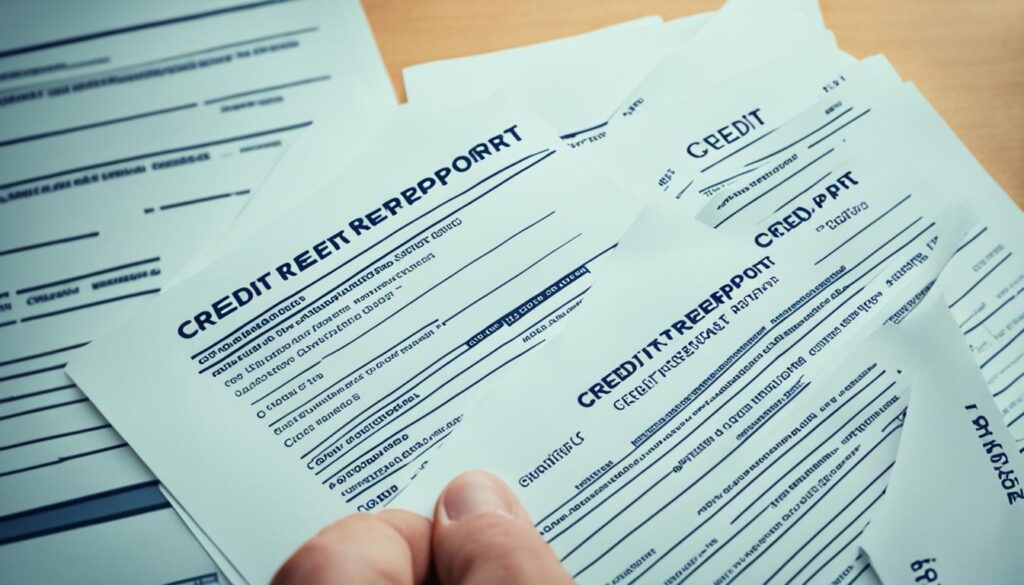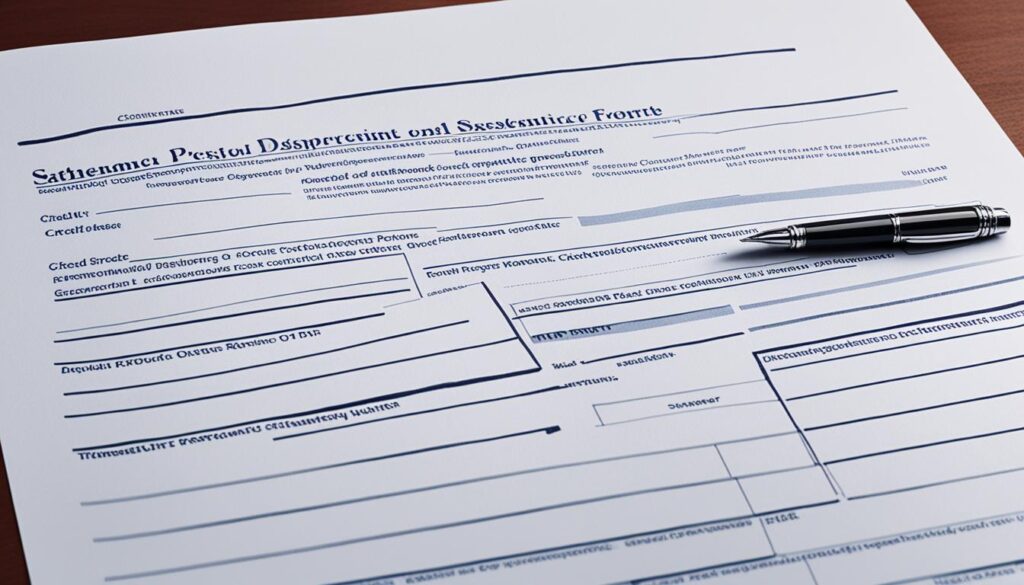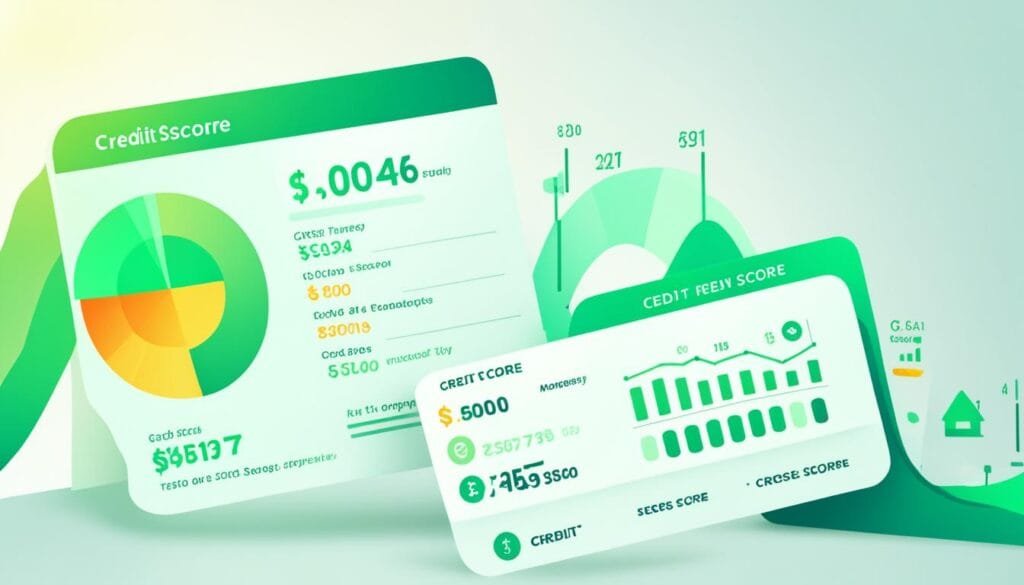Your credit report is a crucial document that can have a significant impact on your financial life. It affects your ability to borrow money, obtain employment, and even rent a home. Therefore, it is essential to ensure that the information on your credit report is accurate and up-to-date. In this guide, we will provide you with step-by-step instructions on how to dispute any errors or incorrect credit information and effectively correct your credit report.
Disputing Credit Report Errors is the key to protecting your financial reputation. By taking the necessary steps to correct any inaccuracies in your credit report, you can ensure that your creditworthiness is accurately reflected. Let’s dive into the process of disputing incorrect credit information and learn how you can take control of the accuracy of your credit report.
Key Takeaways:
- Regularly monitor your credit report for errors or incorrect information.
- If you find any discrepancies, take immediate action to dispute them.
- Contact the credit bureau reporting the error and provide a clear explanation.
- Gather supporting documentation to substantiate your claim.
- Keep copies of all correspondence for your records.
Why Is it Important to Have an Accurate Credit Report?
Your credit report is not just a document; it has real-life implications. Lenders, employers, landlords, and insurance providers all rely on the information in your credit report to make important decisions about whether to do business with you. An inaccurate credit report can negatively impact your buying power, job prospects, insurance rates, and ability to rent a home.
When lenders review your credit report, they assess your creditworthiness and decide whether to approve your loan application, the interest rate they will offer you, and the credit limit they will extend. Mistakes in your credit report, such as incorrectly reported late payments or outstanding balances, can result in higher interest rates or even loan denials.
Similarly, employers may consider your credit report as part of their screening process. They believe that someone with financial difficulties may be more prone to theft or fraud. Inaccurate negative information on your credit report could affect your ability to secure job opportunities, particularly in industries where financial responsibility is crucial.
Landlords rely on credit reports to help them make informed decisions about potential tenants. They use credit reports to assess whether you are likely to pay rent on time and take care of the property. A negative credit report with incorrect derogatory marks or delinquent accounts can lead to rental application rejections or higher security deposits.
Insurance providers also use credit reports to evaluate the risk profile of potential policyholders. A poor credit report may result in higher insurance premiums or even denials of coverage. On the other hand, a positive credit report may help you qualify for better rates and save money on insurance expenses.
To emphasize the importance of an accurate credit report, consider the following examples:
Alex has been diligently paying all his bills on time and maintaining a low credit utilization ratio. However, his credit report mistakenly shows several missed payments and maxed-out credit cards. When Alex applies for a mortgage, the lender considers him a higher risk and offers him a much higher interest rate. As a result, Alex’s monthly mortgage payments increase substantially, limiting his buying power and financial options.
Sarah is a recent college graduate looking for her first full-time job. Her credit report contains multiple errors, including an incorrectly reported bankruptcy. When Sarah sends out her resume and attends interviews, potential employers notice the bankruptcy mark on her credit report. Despite Sarah’s excellent qualifications, employers are hesitant to hire her, fearing potential financial liability. The inaccurate information on Sarah’s credit report hampers her job prospects and delays her career progression.
Regularly checking your credit report for accuracy is essential to ensure that it reflects your true financial status. By monitoring and disputing any errors or discrepancies, you can protect your buying power, job prospects, insurance rates, and rental opportunities. Maintaining an accurate credit report is an important aspect of managing your financial health and building a solid financial foundation for the future.
Key Takeaways
- An accurate credit report is crucial for making important financial decisions.
- Lenders, employers, landlords, and insurance providers rely on credit reports to assess creditworthiness, job suitability, rental history, and insurance risk.
- Inaccurate credit reports can negatively impact buying power, job prospects, insurance rates, and rental opportunities.
- Regularly monitoring and disputing credit report errors is vital to protect your financial reputation.
| Credit Report Errors | Impact |
|---|---|
| Incorrectly reported late payments | Higher interest rates, loan denials |
| Delinquent accounts | Difficulty securing job opportunities |
| Derogatory marks | Rental application rejections, higher security deposits |
| Maxed-out credit cards | Higher insurance premiums, coverage denials |
How to Obtain Your Credit Report
Your credit report is a crucial document that provides an overview of your financial history and creditworthiness. To ensure its accuracy, it’s essential to regularly review your credit report for any errors or discrepancies. In this section, we will guide you through the process of obtaining your credit report from the three major credit bureaus – Experian, Equifax, and TransUnion.
Accessing Free Credit Reports
You have the right to access free copies of your credit report from each of the three major credit bureaus once every 12 months. This means you can obtain a total of three free credit reports per year. To access your free credit reports, you can visit AnnualCreditReport.com, the official website provided by the credit bureaus.
AnnualCreditReport.com is a secure platform authorized by law to provide free credit reports to consumers. It is important to be cautious of other websites that claim to offer free credit reports as they may require payment or sign-ups for services.
Once you visit AnnualCreditReport.com, you will need to provide some personal information, including your name, date of birth, Social Security number, and address. The website will then verify your identity and guide you through the process of accessing your credit reports from Experian, Equifax, and TransUnion.
Obtaining your credit reports through AnnualCreditReport.com is a convenient and reliable way to stay informed about your credit history and monitor for any issues or inaccuracies.
Increased Access with Free Weekly Reports
In addition to the free annual credit reports, the credit bureaus now offer a program that allows you to check your credit report from each bureau once a week for free. This increased access provides more frequent monitoring and enables you to identify any errors or discrepancies more quickly.
To access your free weekly credit reports, you can visit the individual websites of Experian, Equifax, and TransUnion. Each bureau has its own process for requesting and viewing your weekly credit report, which may require creating an account or providing additional information for verification.
By regularly reviewing your credit reports, whether annually or weekly, you can stay informed about your credit status, detect any inaccuracies, and take appropriate actions to correct them. Monitoring your credit reports is an essential step in maintaining healthy financial well-being.

Why Obtaining Your Credit Report is Important
“Your credit report provides a comprehensive view of your financial history and plays a crucial role in various aspects of your life, including obtaining loans, renting a home, and even securing employment. It is vital to be proactive in ensuring the accuracy of your credit report to avoid any negative consequences.” – Financial Expert
Your credit report serves as a reflection of your creditworthiness and affects the decisions made by lenders, landlords, and even potential employers. By obtaining and regularly monitoring your credit report, you can:
- Identify and dispute any errors or discrepancies in your credit history
- Take necessary actions to improve your credit score
- Protect yourself against identity theft or fraud
- Understand your financial standing and make informed decisions
By staying informed about your credit report, you have better control over your financial future and can take proactive measures to maintain a positive credit profile.
How to Dispute Credit Report Errors
If you find errors in your credit report, it is crucial to take immediate action to correct them. The first step is to contact the credit bureau that is reporting the inaccurate information. You can do this by mail, online, or by phone.
Provide a clear explanation of the error and include any supporting documentation. Keep copies of all correspondence for your records. The credit bureau has 30 days to investigate your dispute and must provide you with the results in writing.
If you prefer to submit your dispute in writing, you can create a credit report dispute letter. Clearly state the inaccurate information and why you believe it is incorrect. Remember to include your contact information and any supporting documents.
Some credit bureaus also provide an online form for credit report disputes. This can be a convenient and efficient way to submit your dispute. Simply fill out the form with the necessary information and attach any relevant documents.
Additionally, many credit bureaus offer the option to dispute credit report errors online. This streamlined process allows you to upload supporting documents and provide a detailed explanation of the discrepancies. It is important to review the credit bureau’s guidelines and requirements for online disputes.
What to Include in Your Dispute Letter or Form:
- Detailed explanation of the error.
- Your contact information.
- Supporting documentation.
Disputing credit report errors is an essential step in ensuring the accuracy of your credit history. Taking proactive measures to correct any inaccuracies can help protect your financial reputation and improve your creditworthiness. By following these steps, you can navigate the credit report dispute process and work towards an accurate and reliable credit report.
What if the Investigation Doesn’t Resolve Your Dispute?
If the investigation conducted by the credit bureau does not result in a resolution of your dispute, there are additional steps you can take to address the issue. You have the right to request that a statement of dispute be included in your credit file. This statement will provide an explanation of your position and will be visible to anyone who accesses your credit report.
Furthermore, if it is determined that the disputed information on your credit report is inaccurate or incomplete, both the credit bureau and the furnisher of the information are obligated to update or delete the incorrect derogatory marks from your credit report. It is crucial to regularly review your credit report to ensure that any necessary corrections have been made.
To summarize:
If the investigation doesn’t resolve your dispute:
- Request a statement of dispute to be included in your credit file.
- Regularly review your credit report to ensure that corrections have been made.
- Verify that incorrect derogatory marks have been updated or deleted.
Continuing to actively monitor and manage the information on your credit report is essential for maintaining an accurate and reliable credit profile.

Examples of Statements of Dispute
Here are a few examples of statements of dispute that you can include in your credit file:
| Example 1 | Example 2 | Example 3 |
|---|---|---|
| “I dispute the negative credit information reported by [Credit Bureau Name] due to [reason for dispute].” | “I believe the incorrect derogatory marks on my credit report from [Credit Bureau Name] are unjustified and inaccurate.” | “The negative credit information reported by [Credit Bureau Name] does not accurately reflect my credit history and should be removed.” |
Contacting the Data Furnisher
In addition to contacting the credit bureau, it is important to reach out to the company that provided the inaccurate information, also known as the data furnisher. These data furnishers can include banks, credit card issuers, and other financial institutions.
If the furnisher’s address is listed on your credit report, you can send your dispute directly to them. Look for the correct address and ensure that your dispute includes all the relevant information and supporting documentation.
However, if the furnisher’s address is not mentioned on your credit report, you will need to contact the company and ask for the correct address. This step is crucial to ensure that your dispute reaches the right entity and can be properly investigated.
To effectively dispute the error, it is important to communicate with both the credit bureau and the data furnisher. This ensures that both parties are aware of the inaccurate information and can take the necessary steps to correct it. By reaching out to the data furnisher, you increase your chances of getting the incorrect information rectified in a timely manner.
Remember, disputing information with data furnishers is an essential part of the credit report dispute process. Don’t hesitate to take action and contact the appropriate parties to ensure that your credit report reflects accurate and up-to-date information.
What are the Steps to Correct Credit Report Mistakes and Dispute Inaccuracies?
If you find errors in your credit report, disputing credit report inaccuracies is the way to correct them. Start by getting a copy of your report, identifying any mistakes, then filing a dispute with the credit bureau. Provide supporting documents and follow up to ensure the inaccuracies are resolved.
Conclusion
Disputing credit report errors is crucial for protecting your financial reputation. An accurate credit report is essential for increasing your buying power, improving your job prospects, and securing better insurance rates. In today’s credit-driven society, regularly monitoring your credit report and taking immediate action to correct any errors is a must.
Remember to keep copies of all correspondence with the credit bureaus and data furnishers. Following up on your disputes is important to ensure that any necessary corrections are made. By being proactive and diligent in managing your credit report, you can maintain an accurate and reliable credit history.
Don’t underestimate the impact of an accurate credit report. Stay vigilant, dispute any errors, and protect your financial reputation.
FAQ
Why is it important to have an accurate credit report?
Having an accurate credit report is crucial because it can impact your buying power, job prospects, insurance rates, and ability to rent a home. Lenders, employers, landlords, and insurance providers rely on the information in your credit report to make important decisions about doing business with you.
How can I obtain my credit report?
You have the right to access free copies of your credit report from Experian, Equifax, and TransUnion once every 12 months. To obtain your free credit reports, you can visit AnnualCreditReport.com. The credit bureaus also offer a program that allows you to check your credit report from each bureau once a week for free.
How do I dispute credit report errors?
To dispute credit report errors, you need to contact the credit bureau that is reporting the inaccurate information. You can do this by mail, online, or by phone. Provide a clear explanation of the error and include any supporting documentation. The credit bureau has 30 days to investigate your dispute and must provide you with the results in writing.
What if the investigation doesn’t resolve my dispute?
If the investigation does not resolve your dispute, you can request that a statement of the dispute be included in your credit file. This statement will explain your position and will be visible to anyone who accesses your credit report. Additionally, if the disputed information is found to be inaccurate or incomplete, the credit bureau and the furnisher of the information must update or delete the information from your credit report.
How do I contact the data furnisher?
In addition to contacting the credit bureau, you may need to contact the company that provided the inaccurate information, known as the data furnisher. If the furnisher’s address is listed on your credit report, send your dispute directly to them. If not, contact the company and ask for the correct address. It is important to dispute the error with both the credit bureau and the data furnisher to ensure that the inaccurate information is corrected.

